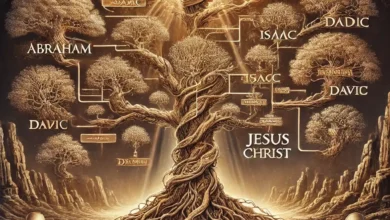
According the Bible, what was the religion of Christ
What was the religion of Christ? This simple question tells a powerful story about our faith.
What was the religion of Christ? This simple question tells a powerful story about our faith. Christianity is unique among the world’s religions because we worship God incarnate, Jesus Christ, who is fully God and fully human. God became man and lived in a specific time and place in history. Therefore, we can know things about the man who was God and ask questions about him, such as, “What was the religion of Christ?”
According to the sacred writings, Jesus was born in Bethlehem of Judea. His mother was Mary, who was a virgin before giving birth to Jesus, and her husband was Joseph, who had traveled to that city to register for the census. Luke records the time of Jesus’ birth during the reign of Caesar Augustus and the governorship of Quirinius over Syria. While the traditional celebration of Christ’s birth is on December 25th, we do not know the exact day. However, we can estimate Jesus’ arrival around 2 or 3 BC. At that time, more than one calendar system was in use, so while some place his birth in 1 AD, it was likely a bit earlier.
Most importantly, Jesus was born at a particular point in history, spent his entire life in a specific geographical area, and died and was resurrected at a particular time and place. So, when Jesus lived on earth, what religion did he follow?(religion of Christ)
Read more : The meaning of the blood of Christ in the Bible
فرست محتوا
- 1
- 2 What religion did Jesus’ people follow? (What was the religion of Christ?)
- 3 What significant events changed the Jewish religion before Jesus’ time? (What was the religion of Christ?)
- 4 What were the main Jewish religious groups during Jesus’ time? (What was the religion of Christ?)
- 5 Did Jesus say He was changing or fulfilling the Jewish religion?
- 6 Did Jesus leave us any religion to follow?
What religion did Jesus’ people follow? (What was the religion of Christ?)
Both Matthew and Luke trace Jesus’ genealogy directly to the family of Israelites who practiced the Jewish religion. Joseph and Mary, his parents, were Israelites who raised Jesus according to Jewish tradition. Jesus was Jewish through his human mother and lived according to the laws of Judaism.
Don Wilson writes, “While Joseph’s genealogy in Matthew 1:1-16 shows Jesus’ connection to the throne of David, Mary’s genealogy is given in Luke 3:23-38. Her name is not mentioned there, but women’s names were generally not included in genealogies. Mary was the daughter of Heli, a descendant of Judah, and Joseph is listed as the ‘son’ of Heli by marriage to Mary. (Joseph’s biological father was Jacob.) Mary was from the tribe of Judah, the lineage of Christ. The names listed in Mary’s genealogy include David, Boaz, Judah, Jacob, and Isaac, reaching back to Adam.”
The story of Jesus’ birth begins the New Testament. The history of Judaism is recorded in the Old Testament of the Christian Bible, which shares the first five books, or the Torah, with the followers of Judaism, a covenant-based religion.
Genesis 12:1-3 records what is known as the Abrahamic Covenant when the Lord called Abram (who was later called Abraham) and promised to make him a great nation through whom God would bless the earth.
“The Lord had said to Abram, ‘Go from your country, your people, and your father’s household to the land I will show you. I will make you into a great nation, and I will bless you; I will make your name great, and you will be a blessing. I will bless those who bless you, and whoever curses you, I will curse; and all peoples on earth will be blessed through you.'” (ESV)
Abraham was a descendant of Noah, with whom God made the Noahic Covenant and promised never to flood the earth again (Genesis 9:8-17). But it was with Abraham that God began setting apart a nation for Himself to worship Him.
Genesis describes the growth of Abraham’s descendants through the patriarchs: Abraham, Isaac, and Jacob, who was called Israel. From Israel came the twelve tribes of Israel, from which the promised Messiah would descend through Judah. After delivering His people from slavery in Egypt, God made a covenant with Moses (the Mosaic Covenant) and gave Moses the laws, festivals, sacrifices, and traditions by which His people were to live. God then promised King David (the Davidic Covenant) that a son of David would always sit on the throne forever, and this son would be God. Jesus, as a Jewish man from the lineage of Judah, lived in Israel and followed the laws, festivals, sacrifices, and traditions of His people.
What significant events changed the Jewish religion before Jesus’ time? (What was the religion of Christ?)
After King David’s reign, his son Solomon ruled. Solomon built a great temple to worship God and was the wisest king in history. However, in his later reign, Solomon ignored wisdom to indulge his desires. Through Solomon’s many wives, idolatry entered Israel.
“The Lord said to Solomon, ‘Since this is your attitude and you have not kept my covenant and my decrees, which I commanded you, I will most certainly tear the kingdom away from you and give it to one of your subordinates. Nevertheless, for the sake of David your father, I will not do it during your lifetime. I will tear it out of the hand of your son.'” (1 Kings 11:11-12 NIV)
Shortly after that, under Solomon’s sons, the kingdom of Israel was divided into northern and southern kingdoms. Despite decades of prophetic warnings to repent, Israel’s idolatry persisted. Eventually, God brought judgment upon His people and allowed enemy tribes to conquer them. The temple was destroyed in 586 BC by the Babylonians when they conquered Israel. The conquering nations scattered the Jews to various places outside Israel, and they were not allowed to return until the Persian Empire, under the command of Cyrus, granted permission.
In the books of Nehemiah and Ezra, we see the Jews returning to Israel and rebuilding the city. The Second Temple was built, also known as Herod’s Temple. Israel suffered in various ways under successive empires that tried to destroy their culture. During the Greek Empire, under the rule of Antiochus IV Epiphanes, the temple was desecrated. Antiochus then forced the Jews to assimilate to Hellenistic practices, which led to the Maccabean Revolt (from which the Hanukkah tradition originates). Between the Old and New Testaments, there were 400 years of silence from God.
When Jesus was born, the Jews, always a small nation, were living under Roman rule. The Romans allowed them to practice their religion (religion of Christ) as long as they remained peaceful and did not cause trouble for those who governed them.
What were the main Jewish religious groups during Jesus’ time? (What was the religion of Christ?)
During Jesus’ time, the Sanhedrin governed the temple.
The Sanhedrin was a council composed of Pharisees and Sadducees. They were the highest judicial and religious leaders of the Jews until the temple’s destruction in 70 AD. The Sadducees believed that only the Torah was the governing authority and denied supernatural activities such as angels, resurrection, and traditions created by the Pharisees. These two groups often fought for power. Both John the Baptist and Jesus condemned the attitudes and behaviors of the Sadducees.
In contrast, the Pharisees believed in angels, demons, the resurrection, and more supernatural aspects. They also created traditions or “fences” around the law to protect people from sin. For example, they defined what it meant to work on the Sabbath and set strict regulations. While some Pharisees were interested in Jesus or eventually came to believe in Him (such as Nicodemus, Saul/Paul), both John the Baptist and Jesus called all Pharisees to repent of hypocrisy and legalism.
Two other ruling groups during this period were:
The Zealots, as Ben Reichert says, “were a liberal group that wanted to serve only God. And one of them played an important role in Jesus’ ministry.” The Zealots believed that action was needed to overthrow the government and restore Israel’s independence, sometimes through extreme measures. Their view of the Messiah was a political and military leader who might lead the establishment of an earthly kingdom. Simon the Zealot (Mark 3:18) was one of the twelve apostles.
The Essenes (never mentioned in the Bible) were a separatist group that viewed the Jewish priesthood as corrupt and withdrew themselves. The Essenes became known in modern times through the discovery of the Dead Sea Scrolls. One theory about the survival of these scrolls is attributed to the Essenes’ dedicated work and preservation.
In every age, religion is often practiced by people with differing views of how that religion should be lived. The times in which Jesus lived were no different.
Did Jesus say He was changing or fulfilling the Jewish religion?
Jesus said in Matthew 5:17-18, “Do not think that I have come to abolish the Law or the Prophets; I have not come to abolish them but to fulfill them. For truly, I tell you, until heaven and earth disappear, not the smallest letter, not the least stroke of a pen, will by any means disappear from the Law until everything is accomplished.”
He told His followers that unless their righteousness exceeded that of the Pharisees and Sadducees, they would not enter the kingdom of heaven (Matthew 5:20). With these words, He hinted at what was to come: He would die in our place, rise again, and we would inherit His righteousness as our own.
The religion of Christ was Jewish, and He did not abolish it. He began a new era with His coming. The Jewish people lived according to God’s word, but in Jesus, as John explains, “The Word became flesh and made his dwelling among us. We have seen his glory, the glory of the one and only Son, who came from the Father, full of grace and truth.” (John 1:14 NIV)
Jesus lived and walked as a Jew among His people. His teachings and miracles, however, were a continuation and fulfillment of God’s work, not a contradiction of it.

Did Jesus leave us any religion to follow?
Today, we often forget that the Christian faith, for the first few decades after Jesus’ death and resurrection, was almost exclusively Jewish. The earliest Christians followed Jewish laws and traditions, interpreting them in the light of Jesus’ resurrection and teachings.
However, with time, the gospel began to spread to non-Jewish (Gentile) nations, and the question arose whether new believers needed to follow Jewish laws, such as circumcision and dietary regulations. The early church, guided by the Holy Spirit, decided that Gentile believers did not need to become Jews to follow Jesus (Acts 15). Instead, faith in Jesus as the Messiah became the defining characteristic of the Christian faith.
So, Jesus did not leave us a “new religion” in the sense that He created something entirely separate from Judaism. Instead, He fulfilled and completed God’s covenant with Israel. Christians believe that by following Jesus, we participate in this new covenant, living in the grace and truth that He embodied.
Jesus’ death and resurrection marked the beginning of a new era in God’s plan for humanity. The new covenant was promised through the prophets (Jeremiah 31:31-34) and fulfilled in Jesus Christ, who said at the Last Supper, “This cup is the new covenant in my blood, which is poured out for you.” (Luke 22:20 NIV)
While Christianity and Judaism are distinct religions today, the roots of Christianity are deeply entwined with the Jewish faith. As Christians, we believe that by following Jesus, we are following the same God who called Abraham, Isaac, and Jacob and who revealed Himself through the Law and the Prophets. The religion of Christ was the continuation and fulfillment of God’s plan, which began in the Old Testament and was brought to completion in the New Testament.






